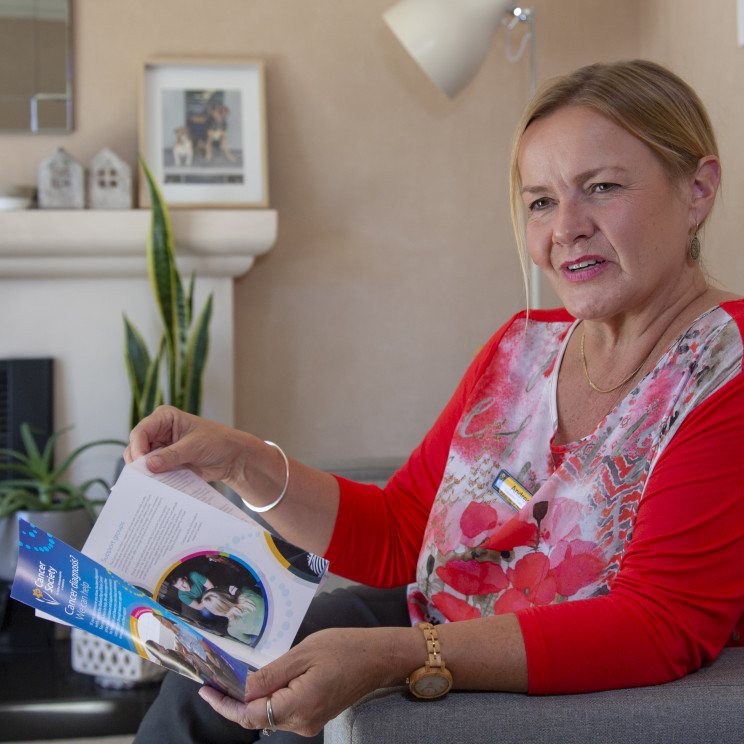Read about what lung cancer is, types of lung cancer, risk factors for lung cancer and symptoms of lung cancer.
Download the whole lung cancer booklet
Our new booklet 'Understanding lung cancer' is available now.
Download Section One of our lung cancer booklet: Understanding lung cancer
Lung cancer is one of the most common cancers in Aotearoa New Zealand and can affect anyone.
This page is about primary lung cancer. If cancer starts in another part of the body and spreads to the lungs this is called secondary cancer in the lung.
For more information on secondary cancer in the lung, please see the Cancer Society's page on advanced cancer.
- Lung cancer is cancer of some of the cells in part of the lungs and usually begins in the lining of the airway.
- Secondary cancer in the lungs is common. This is cancer that has started somewhere else in the body and spread to the lungs.
- There are two main types of lung cancer:
- Small cell lung cancer
- Non-small cell lung cancer
- Tobacco smoking is the greatest risk factor for lung cancer.
- The symptoms of lung cancer can be different from person to person. It is important to have your GP or whānau doctor check any symptoms you have. You can read more about the symptoms of lung cancer below.
- Ko te matepukupuku o ētahi pūtau kei ētahi wāhi o te pūkahukahu te matepukupuku pūkahukahu. I te nuinga o te wā, tīmata ai ki te whakapaparanga ngongo hau.
- E rua ngā momo matepukupuku pūkahukahu matua:
- Matepukupuku pūkahukahu pūtau iti
- Matepukupuku pūkahukahu pūtau iti-kore – adenocarcinoma, squamous matepukupuku kiri me te matepukupuku kiri pūtau nui
- Ko te momi tupeka te take mōrearea rawa atu mō te matepukupuku pūkahukahu.
- He rerekē ngā tohumate o te matepukupuku pūkahukahu mai tēnā tangata, ki tēnā tangata. He mea nui kia arowhaitia ngā tohumate ka puta, e tō Tākuta Whānau:
- maremare e kore e pai ake, he panoni rānei ki te āhua o tō maremare kua roa nei e mau ana ki a koe
- ngaronga reo, panonitanga rānei o te reo (whango)
- kua hēmanawa te mahi hā, kua tīmohu rānei ahakoa kīhai koe i korikori, te kore rānei ōu e āhei ki te whai i āu mahi aua
- He whakapokenga poho e kore e pai ake ahakoa ngā maimoa, he nui rawa rānei ngā wā puta ake ai te whakapokenga poho
- he mamae poho, mamae tuarā whakarunga, mamae pokohiwi rānei, e kore e mutu
- te maremare toto
- he ngaronga taumaha mō te kore noa iho, ngaronga hiakai rānei
- kua tino pokea e te hiamoe

What is lung cancer?
Primary lung cancer is cancer that starts in some of the cells in the lungs, usually beginning in the lining of the airways. These abnormal cells grow into tumours. Primary lung cancer can spread as secondaries (metastases) to any other part of the body.
Secondary cancer in the lungs is common. This is cancer that has started somewhere else in the body (for example, bowel or breast) and spread to the lungs.
What types of lung cancer are there?
There are two main types of lung cancer:
- Small cell lung cancer (SCLC) makes up about 15-20 percent of lung cancers
- Non-small cell lung cancer (NSCLC) is the most common type and makes up about 80 percent of all lung cancers. NSCLC is divided into several specific types.
Your specific type of lung cancer needs to be diagnosed to help decide on the best treatment for you.
Mesothelioma is a rare cancer that occurs in the outer lining of the lung (pleura) but it is not the same as lung cancer. This type of cancer is most often linked with asbestos exposure.
Find out more about mesothelioma
What are the risk factors for lung cancer?
Things that can increase your chances of developing cancer are called risk factors
- Tobacco smoking is the greatest risk factor, while exposure to asbestos also increases the chance of developing lung cancer.
- Some risk factors, such as smoking, can be changed. Some risk factors can’t be changed, such as having a strong family history of cancer.
- Having one or more risk factors does not mean that you or your whānau will develop cancer.
Common risk factors for lung cancer
- Tobacco (smoking) - although around 15% of people with lung cancer will have never smoked
- Smoke (second-hand)
- Ageing
- Genetics (family history)
- Occupation (e.g. miners)
- Pollution (e.g. smog)
What are the symptoms of lung cancer?
The symptoms of lung cancer can be different from person to person. It is important to have your GP or whānau doctor check any of these symptoms:
- A cough that doesn’t go away or a change in a cough you have had for a long time
- Loss of voice or a change in voice (hoarseness)
- Feeling breathless or wheezy without exercising, or becoming unable to do your usual activities
- A chest infection that doesn’t improve with treatment, or frequent chest infections
- Chest, upper back or shoulder pain that does not go away
- Coughing up blood
- Weight loss for no reason, or loss of appetite
- Feeling very tired
